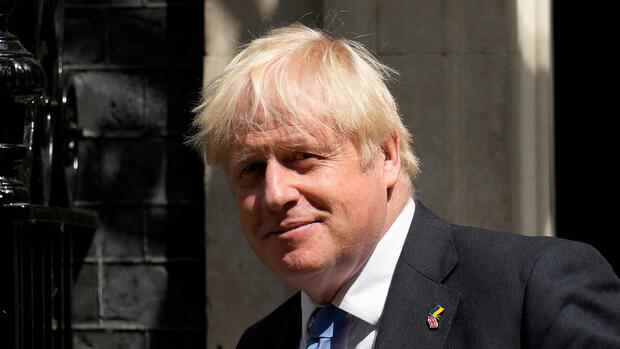Under the still Prime Minister, the controversial Northern Ireland Act was recently passed.
(Photo: AP)
Brussels The economic prospects are not particularly encouraging on either side of the English Channel: prices are rising, growth is falling. The cost of the war in Ukraine is high, and things could get much worse if Russian President Vladimir Putin cuts the gas altogether.
Starting a trade war among allies in such a situation would be highly absurd. But this is precisely the direction in which Great Britain and the EU seem to be heading. In the dispute over the Northern Ireland Protocol, part of the 2019 Brexit agreement, the contracting parties continue to push each other up.
On Friday, the EU Commission opened four new infringement procedures against London, bringing the total to seven. Two days earlier, the British House of Commons passed Prime Minister Boris Johnson’s controversial Northern Ireland Bill. This law empowers the government to overturn the Northern Ireland Protocol – a breach of international law from the EU’s point of view.
Both sides only want their steps to be understood as a warning, but they seem caught in the logic of escalation. There are no signs of relaxation to be found, the right-wingers rule here and there.
Top jobs of the day
Find the best jobs now and
be notified by email.
If things continue like this, a trade war is only a matter of time: sooner or later, protest notes and lawsuits will be followed by fines and finally punitive tariffs.
Carsten Volkery is a Handelsblatt correspondent in Brussels.
(Photo: Klawe Rzeczy)
The race for Johnson’s successor gives new cause for concern. The prime minister is leaving at the beginning of September, and according to polls, foreign minister Liz Truss has better chances in a duel with ex-finance minister Rishi Sunak. Relations with the EU would hardly recover under Prime Minister Truss, because she is considered Johnson’s number two.
>> Read here: Mordaunt is out: Rishi Sunak and Liz Truss are fighting to succeed Johnson
There was a brief glimmer of hope in Brussels last winter when immobile Brexit Secretary David Frost resigned and Truss was appointed the new chief negotiator with the EU. It was said at the time that Truss was more diplomatic than Frost. But this quickly turned out to be an illusion. The Foreign Minister continued the confrontational course unchanged.
EU worried about the single market
Truss has operated as a 150 per cent pro-Brexit since voting to stay in the 2016 referendum, putting herself on the wrong side of the Conservative party. Since she is still trying to compensate for this supposed mistake, she would probably find it more difficult than Sunak to accommodate the EU.
The British Foreign Secretary caused disappointment in Brussels.
(Photo: Reuters)
A fresh start in the bilateral relationship is urgently needed. How ritualized and meaningless the exchange of blows has now become can be seen from the same statements made by those involved: some MEPs don’t even bother to reformulate their outrage at another provocation from London, but simply look for an old press release and send them again.
For a solution, both sides would have to admit that they have built a bugbear. The EU exaggerates the danger for the internal market that emanates from goods from the third country Great Britain. The vast majority of goods exported to Northern Ireland stay there and do not go on to Ireland. Equally untenable is the British belief that the EU has no say in Northern Ireland. After all, the province is and will remain part of the European single market.
Both positions are not sustainable. It is to be hoped that a trade war does not have to start before this insight grows.
More: Great Britain needs less ideology and more economic competence
